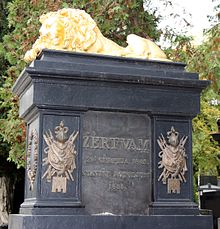People's Party (Kingdom of Croatia)
When it was announced that the Hungarian-allied candidate won, members of the People's Party took to St. Mark's Square to protest the result.The Croatian ban, ethnic Hungarian Franz Haller called on the Austrian army to empty the square.Due in large part to this incident, ban Haller left his post and bishop Juraj Haulik took his place soon after.In the following years, Croatia did gain some concessions as Croatian replaced Latin as the nation's official language.The People's Party remained in power but enabled a policy of Magyarization, which resulted in major discontent with ban Khuen Hedervary in 1903.
Ljudevit GajIvan Kukuljević SakcinskiIvan MažuranićZagrebNarodne novineIdeologyLiberalismIllyrianismPolitics of CroatiaPolitical partiesElectionsCroatianHabsburg Kingdom of CroatiaKingdom of Croatia-SlavoniaIllyrian movementCroatsSouth SlavsVaraždin CountyBjelovar-Križevci CountyCroatian ParliamentJanko DraškovićJosip Juraj StrossmayerJuly victimsAustrianZagreb CountyPeople's PartySt. Mark's SquareFranz HallerJuraj HaulikCroatian-Hungarian PartyKingdom of Dalmatiasister party in DalmatiaMagyarizationKhuen HedervaryCroatian-Serbian CoalitionParty of RightsIndependentsRadicalsAustro-HungaryWorld War IKingdom of Serbs, Croats and SlovenesPučka strankaCroatian People's PartyHorvat, RudolfMatica hrvatskaUnionist PartyIndependent People's PartySerb People's Radical PartyCroatian Peasant PartyCroat-Serb CoalitionSerb Independent PartySocial Democratic Party of Croatia and Slavonia